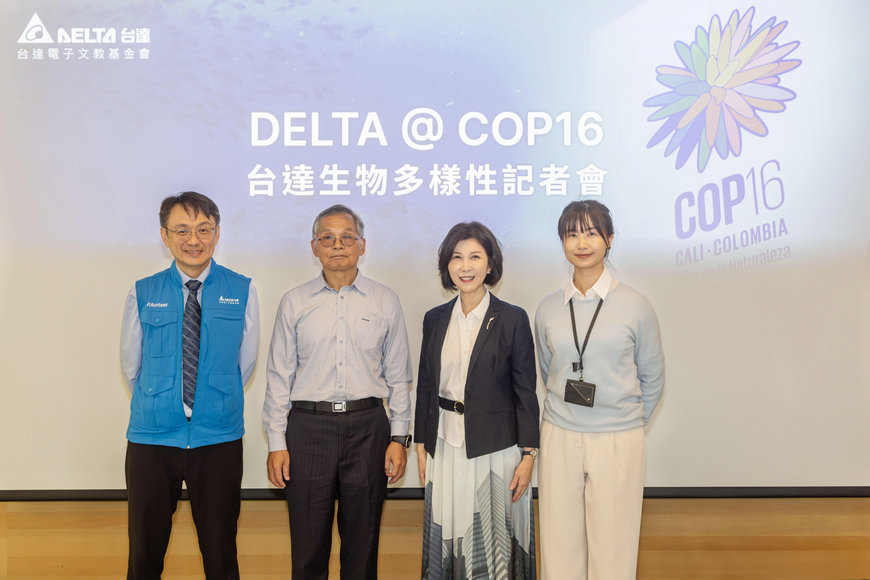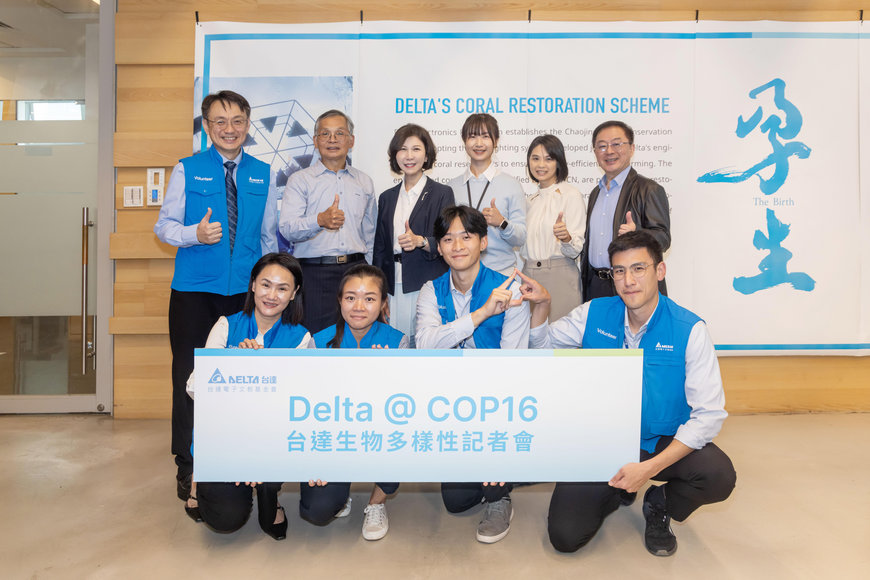www.industryemea.com
04
'24
Written on Modified on
Delta Becomes First Corporation in Taiwan to Serve as an Official Observer at the UN Biodiversity Conference (COP16)
Delta became the 1st corporation in Taiwan to participate in the United Nations Convention on Biological Diversity (CBD) COP 16 conference, held in Colombia, as an official observer through its foundation.

The Delta Electronics Foundation organized four events onsite, including two side events where it shared coral reservation and one side event that is related to green buildings and corporate biodiversity policies. At its booth, Delta showcased its coral restoration achievements. Those events attracted hundreds of international climate leaders. Today, Delta held a press conference in Taiwan to share these achievements and help Taiwanese stakeholders stay informed about global climate trends.
Shan-Shan Guo, Chief Brand Officer of Delta and Vice Chairperson of the Delta Electronics Foundation, said, “As an official observer to the United Nations Framework Convention on Climate Change (UNFCCC), we have actively participated annually since 2007, bringing back the latest carbon reduction information and sharing how Delta leverages its strengths to address global warming. This year, we are honored to gain observer status at CBD COP 16, allowing us to present Delta's biodiversity efforts and results on the international stage. Recently, the world has been accelerating the disclosure of biodiversity impacts, with over 300 companies committed to adopting the 'Taskforce on Nature-related Financial Disclosures (TNFD)' recommendations. Delta began implementing TNFD in 2021, became a TNFD Forum member in 2023, and has since been listed as one of the first cohort of TNFD Early Adopters globally, setting a benchmark for the technology industry and fulfilling our sustainability commitments. Delta's foundation will continue restoring corals, and this year we have invited Professor Chang-Feng Dai, former director of the Institute of Oceanography at National Taiwan University, to serve as our chief consultant, guiding related research projects and presenting at COP16 side events. Leveraging Professor Dai's pioneering research and experience in the field, we aim to restore 10,000 coral colonies by 2025.”

Dr. Chang-Feng Dai, Chief Consultant of Delta Foundation’s “The Birth Coral Restoration Project”, said, "It's encouraging to see academia and corporations collaborating for coral restoration, especially with the introduction of technology to enhance coral heat tolerance. Delta has supported Taiwanese coral reef researchers in achieving various aspects of research, such as cultivating heat-resilient Pocillopora acuta in laboratories for field restoration, using sexual reproduction for maintaining coral genetic diversity, collecting gametes from spawning corals for artificial incubation, and establishing the Chaojing Coral Conservation Center in Keelung. This center currently houses 20 coral species and 3,000 live coral colonies, aiming to protect at least 30 threatened species listed on the IUCN Red List and endemic Taiwanese species. Once these coral colonies are transplanted into marine protected areas, we will continue monitoring coral fish abundance as a key indicator of restoration success. Additionally, with Delta's Micro-CT technology and next-generation DNA sequencing, we will improve coral species identification and help establish Taiwan’s coral gene bank, integrating with international genetic databases.”
Delta Foundation hosted side events with the International Union for Conservation of Nature (IUCN) at the “Nature Pavilion” and the International Coral Reef Initiative (ICRI) at the “ForCoral Pavilion”, as well as sharing insights with the Mote Marine Laboratory & Aquarium, the Scripps Institution of Oceanography at UC San Diego and Academia Sinica Biodiversity Research Center (BRCAS). Since launching its coral restoration project in 2021, Delta has successfully developed Micro-CT and LED lighting equipment suitable for coral growth, aiding coral reef researchers and institutions both domestically and internationally with data acquisition, research, and ex-situ conservation. During the conference, Delta was also invited by the U.S. Green Building Council (USGBC) to share the correlation between green buildings and biodiversity in the green zone alongside JPMorgan and AECOM. By adopting TNFD methodologies, Delta assessed whether their global operations were situated in biodiversity-sensitive areas, specifically using the Delta Americas headquarters as an example to illustrate how green buildings can avoid and minimize ecological impacts, advancing towards the Net Positive Impact (NPI) target by 2050.
Later this November in Azerbaijan, Delta will participate for the 17th time in the UNFCCC COP29, where it will share innovations in energy-efficient building integration and AI data center operations, continuing to bring back the latest trends from international climate negotiations to Taiwan.
www.deltaww.com
Shan-Shan Guo, Chief Brand Officer of Delta and Vice Chairperson of the Delta Electronics Foundation, said, “As an official observer to the United Nations Framework Convention on Climate Change (UNFCCC), we have actively participated annually since 2007, bringing back the latest carbon reduction information and sharing how Delta leverages its strengths to address global warming. This year, we are honored to gain observer status at CBD COP 16, allowing us to present Delta's biodiversity efforts and results on the international stage. Recently, the world has been accelerating the disclosure of biodiversity impacts, with over 300 companies committed to adopting the 'Taskforce on Nature-related Financial Disclosures (TNFD)' recommendations. Delta began implementing TNFD in 2021, became a TNFD Forum member in 2023, and has since been listed as one of the first cohort of TNFD Early Adopters globally, setting a benchmark for the technology industry and fulfilling our sustainability commitments. Delta's foundation will continue restoring corals, and this year we have invited Professor Chang-Feng Dai, former director of the Institute of Oceanography at National Taiwan University, to serve as our chief consultant, guiding related research projects and presenting at COP16 side events. Leveraging Professor Dai's pioneering research and experience in the field, we aim to restore 10,000 coral colonies by 2025.”

Dr. Chang-Feng Dai, Chief Consultant of Delta Foundation’s “The Birth Coral Restoration Project”, said, "It's encouraging to see academia and corporations collaborating for coral restoration, especially with the introduction of technology to enhance coral heat tolerance. Delta has supported Taiwanese coral reef researchers in achieving various aspects of research, such as cultivating heat-resilient Pocillopora acuta in laboratories for field restoration, using sexual reproduction for maintaining coral genetic diversity, collecting gametes from spawning corals for artificial incubation, and establishing the Chaojing Coral Conservation Center in Keelung. This center currently houses 20 coral species and 3,000 live coral colonies, aiming to protect at least 30 threatened species listed on the IUCN Red List and endemic Taiwanese species. Once these coral colonies are transplanted into marine protected areas, we will continue monitoring coral fish abundance as a key indicator of restoration success. Additionally, with Delta's Micro-CT technology and next-generation DNA sequencing, we will improve coral species identification and help establish Taiwan’s coral gene bank, integrating with international genetic databases.”
Delta Foundation hosted side events with the International Union for Conservation of Nature (IUCN) at the “Nature Pavilion” and the International Coral Reef Initiative (ICRI) at the “ForCoral Pavilion”, as well as sharing insights with the Mote Marine Laboratory & Aquarium, the Scripps Institution of Oceanography at UC San Diego and Academia Sinica Biodiversity Research Center (BRCAS). Since launching its coral restoration project in 2021, Delta has successfully developed Micro-CT and LED lighting equipment suitable for coral growth, aiding coral reef researchers and institutions both domestically and internationally with data acquisition, research, and ex-situ conservation. During the conference, Delta was also invited by the U.S. Green Building Council (USGBC) to share the correlation between green buildings and biodiversity in the green zone alongside JPMorgan and AECOM. By adopting TNFD methodologies, Delta assessed whether their global operations were situated in biodiversity-sensitive areas, specifically using the Delta Americas headquarters as an example to illustrate how green buildings can avoid and minimize ecological impacts, advancing towards the Net Positive Impact (NPI) target by 2050.
Later this November in Azerbaijan, Delta will participate for the 17th time in the UNFCCC COP29, where it will share innovations in energy-efficient building integration and AI data center operations, continuing to bring back the latest trends from international climate negotiations to Taiwan.
www.deltaww.com

